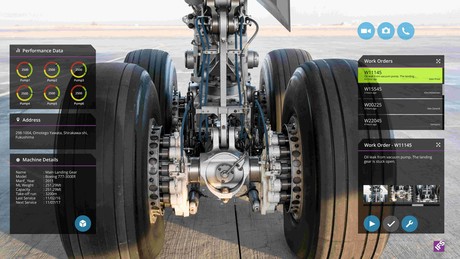IFS using Microsoft HoloLens to develop mixed reality for service technicians

IFS Labs has developed an integration between the enterprise applications suite IFS Applications and Microsoft HoloLens that enables service engineers to visualise holographic IFS software data on the HoloLens screen, which is plotted directly on the asset they are to service.
The data is displayed directly in front of a person’s eyes, enabling technicians to use both hands when servicing the asset. By displaying information as a real-time overlay, technicians get immediate access to relevant asset-specific data such as service history, performance analysis and temperature levels. HoloLens will also make it possible to action the data in real time by clicking a ‘work guidelines’ button to access service instructions stored in IFS Applications.
By leveraging the integrated HoloLens camera, the solution also makes it easy to document the asset and the service performed, and store the information in IFS Applications for future reference.
“We are very excited to present this proof of concept that we believe has the potential to revolutionise the way we think of field service management,” IFS Labs Director Bas de Vos said. “By leveraging the Microsoft HoloLens, we can help service personnel navigate complex environments and access critical asset information to realise major benefits such as increased productivity and first-time fix rates. Field service management is a highly prioritised area for IFS where we have been categorised as leaders by analysts. We will keep pioneering this field with innovative solutions that provide tangible business benefits.”
Microsoft HoloLens Principal Program Manager Brandon Bray said, “We see great potential for using the mixed reality capabilities of Microsoft HoloLens with enterprise software like IFS Applications to empower field service technicians with innovative tools that boost productivity. Microsoft values the collaboration with IFS that helps expand both of our markets and creates new offerings and added value for our customers.”
How does it work?
- A work order is created within IFS Applications, highlighting an asset service need (eg, a malfunctioning oil pump or engine). This can be done either manually or automatically — in the latter case based on IoT data collected from the asset, triggering an automated work order.
- A service engineer is dispatched to repair the asset. Using the integration between the HoloLens and IFS Applications, the engineer wearing the HoloLens can by looking at the asset plot information from the IFS software on the asset. The engineer can see the current and previous work orders related to the asset, as well as key asset performance data points, combined with external data, like temperature levels.
- The HoloLens then displays a a ‘Work Guideline’ button. When this button is pressed, instructions from the IFS software on how to repair the asset are shown on the HoloLens screen. The service engineer can maintain or repair the asset with both hands free using the instructions right before their eyes.
It is also possible to photograph an asset and the service work done using the HoloLens to store that information with the work order within the IFS software for upcoming service calls.
What does the future hold for this technology?
De Vos sees that mixed reality integrated with enterprise software will benefit particularly service- and asset-intensive industries, like manufacturing, oil and gas, energy and aviation. These rely heavily on asset efficiency and uptime for overall business success and equipment malfunctioning can result in substantial financial loss.
This new technology will also impact the everyday work of traditional blue collar professions. Factory workers and service technicians may have to learn to master new technology in their work to be effective and stay competitive. This makes it urgent for companies to train and reskill their staff accordingly.
Analysts predict that augmented reality, virtual reality and mixed reality solutions will impact businesses significantly in the future. One example is Gartner, which predicts that by 2019, AR, VR and mixed reality (MR) solutions will be evaluated and adopted in 20% of large-enterprise businesses.
IFS Labs is exploring making the concept available for other IFS software products in the future.
Cyber attacks on water and electricity operators on the rise: study
A study has revealed that 62% of US and UK water and electricity operators were targeted by...
Orro launches asset discovery service for OT
Australian IT solutions provider Orro has announced it is offering its Digital Asset Discovery...
Rockwell launches factory-scale digital twin technology
Rockwell Automation has launched its Emulate3D Factory Test digital twin software at NVIDIA GTC...








